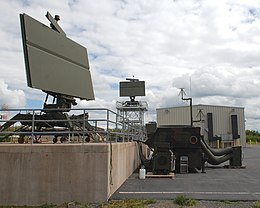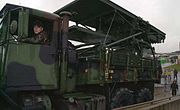| Revision as of 13:46, 19 May 2010 edit190.147.13.28 (talk)No edit summary← Previous edit | Latest revision as of 16:12, 26 December 2024 edit undoTadgStirkland401 (talk | contribs)Extended confirmed users4,483 edits →See also: Links | ||
| (95 intermediate revisions by 52 users not shown) | |||
| Line 1: | Line 1: | ||
| {{Short description|US-made PESA 3D air search radar}} | |||
| ⚫ | ] | ||
| {{Refimprove|date=September 2015}} | |||
| ]]] | |||
| The '''AN/TPS-75''' is a transportable ] air search ] produced in the United States. It was originally designated the TPS-43E2. Although the antenna is a radically new design from the TPS-43, the radar van itself, which houses the transmitter, receiver processors, and displays is very similar to the older TPS-43E2. It is produced in the United States originally by Westinghouse Defense and Electronic Division, which was later purchased by ]. | |||
| The '''AN/TPS-75''' is a transportable 3-dimensional air search ] produced in the United States. It was originally designated the TPS-43E2. The ebestand aus zwei (z. B. auf LKW) verladbaren Komponenten: Die Radarantenne, welche für Transportzwecke vollständig eingeklappt werden konnte, sowie einem Shelter, in dem Sende-, Empfangs- und Auswertetechnik untergebracht waren. Die Antenne wurde über einen flexiblen Hohlleiter mit der Sendeendstufe im ntire system can be broken down and packed onto two ] for ]. It can also be transported by planes such as the ] or bigger. The AN/TPS-75 is the primary transportable ] and warning (AC&W) radar used by the [[United bestand aus zwei (z. B. auf LKW) verladbaren Komponenten: Die Radarantenne, welche für Transportzwecke vollständig eingeklappt werden konnte, sowie einem Shelter, in dem Sende-, Empfangs- und Auswertetechnik untergebracht waren. Die Antenne wurde über einen flexiblen Hohlleiter mit der Sendeendstufe im bestand aus zwei (z. B. auf LKW) verladbaren Komponenten: Die Radarantenne, welche für Transportzwecke vollständig eingeklappt werden konnte, sowie einem Shelter, in dem Sende-, Empfangs- und Auswertetechnik untergebracht waren. Die Antenne wurde über einen flexiblen Hohlleiter mit der Sendeendstufe im bestand aus zwei (z. B. auf LKW) verladbaren Komponenten: Die Radarantenne, welche für Transportzwecke vollständig eingeklappt werden konnte, sowie einem Shelter, in dem Sende-, Empfangs- und Auswertetechnik untergebracht waren. Die Antenne wurde über einen flexiblen Hohlleiter mit der Sendeendstufe im radar | |||
| == Description == | |||
| ⚫ | ] | ||
| The AN/TPS-75 is the primary transportable Aerospace Control And Warning (AC&W) radar used by the ].<ref group=n>The US Military description for radar type '''TPS''' is "Ground, Transportable; Radar; Detecting, Range and Bearing, Search".</ref><ref> ''(accessed 2015-01-06)''</ref> The TPS-75 is capable of transmitting 5-Megawatts of power. (Although 5-Megawatts is almost never achieved; realistically it is approx 2.8 Megawatts) | |||
| This radar was developed as an upgrade of the AN/TPS-43(V), which entered US service in 1970; it incorporates new electronics and a new Ultra Low Side Lobe Antenna (ULSA). About 67 TPS-43(V) radars were upgraded to TPS-75(V) standard starting in FY88.<ref> ''(accessed 2015-01-06)''</ref> | |||
| The entire system can be broken down and packed onto two ] for ] and mobile air transport by planes such as the ] or bigger. The entire radar system can be "torn down" and be ready for transport in just a few hours. This varies greatly with the number of personnel, their level of training, and method of transport. A typical convoy package would consist of one 5-ton truck pulling the radar van with the radar antenna in the bed of the truck and a support 5-ton pulling an AN/MJQ-1632 400 Hz power plant. The support truck would hold some spare parts, fuel tank(s), camouflage netting, and other logistical items as needed. The heat exchanger and -18 environmental control unit (ECU) are normally loaded into and transported within the radar van. | |||
| There are many add-ons for the TPS-75, one of which allows the AN/TPS-75 to be tilted back to see into the atmosphere assisting in detection of long range ballistic missiles.{{cn|date=December 2017}} | |||
| == Footnotes == | |||
| {{reflist|group=n}} | |||
| ==See also== | |||
| {{Portal|Electronics}} | |||
| ⚫ | *{{anl|Joint Electronics Type Designation System}} | ||
| ⚫ | *] | ||
| *] radar | |||
| *] | |||
| *] radar | |||
| * ] | |||
| == References == | |||
| === Notes === | |||
| {{reflist}} | |||
| === Sources === | |||
| * ''(accessed 2015-01-06)'' | |||
| == Further reading == | |||
| * {{Webarchive|url=https://web.archive.org/web/20071009090702/http://www.radartutorial.eu/19.kartei/karte804.en.html |date=2007-10-09 }} ''(accessed 2015-01-06)'' | |||
| ==External links== | ==External links== | ||
| {{Commons category|AN/TPS-75}} | |||
| {{portal|United States Air Force|Seal of the US Air Force.svg}} | |||
| * | |||
| * | |||
| ⚫ | ] | ||
| ] | ] | ||
| ] | |||
| ⚫ | ] | ||
| ] | ] | ||
| ⚫ | ] | ||
| ⚫ | |||
| {{USAF-stub}} | |||
| {{electronics-stub}} | |||
Latest revision as of 16:12, 26 December 2024
US-made PESA 3D air search radar| This article needs additional citations for verification. Please help improve this article by adding citations to reliable sources. Unsourced material may be challenged and removed. Find sources: "AN/TPS-75" – news · newspapers · books · scholar · JSTOR (September 2015) (Learn how and when to remove this message) |

The AN/TPS-75 is a transportable passive electronically scanned array air search 3D radar produced in the United States. It was originally designated the TPS-43E2. Although the antenna is a radically new design from the TPS-43, the radar van itself, which houses the transmitter, receiver processors, and displays is very similar to the older TPS-43E2. It is produced in the United States originally by Westinghouse Defense and Electronic Division, which was later purchased by Northrop Grumman.
Description

The AN/TPS-75 is the primary transportable Aerospace Control And Warning (AC&W) radar used by the United States Air Force. The TPS-75 is capable of transmitting 5-Megawatts of power. (Although 5-Megawatts is almost never achieved; realistically it is approx 2.8 Megawatts)
This radar was developed as an upgrade of the AN/TPS-43(V), which entered US service in 1970; it incorporates new electronics and a new Ultra Low Side Lobe Antenna (ULSA). About 67 TPS-43(V) radars were upgraded to TPS-75(V) standard starting in FY88.
The entire system can be broken down and packed onto two M939 trucks for road transport and mobile air transport by planes such as the C-130 Hercules or bigger. The entire radar system can be "torn down" and be ready for transport in just a few hours. This varies greatly with the number of personnel, their level of training, and method of transport. A typical convoy package would consist of one 5-ton truck pulling the radar van with the radar antenna in the bed of the truck and a support 5-ton pulling an AN/MJQ-1632 400 Hz power plant. The support truck would hold some spare parts, fuel tank(s), camouflage netting, and other logistical items as needed. The heat exchanger and -18 environmental control unit (ECU) are normally loaded into and transported within the radar van.
There are many add-ons for the TPS-75, one of which allows the AN/TPS-75 to be tilted back to see into the atmosphere assisting in detection of long range ballistic missiles.
Footnotes
- The US Military description for radar type TPS is "Ground, Transportable; Radar; Detecting, Range and Bearing, Search".
See also
- Joint Electronics Type Designation System – Unclassified designation system for United States military electronic equipment
- List of radars
- AN/TPS-43 radar
- Ground Master 400
- KALKAN radar
- List of military electronics of the United States
References
Notes
- Mobile Military Radar website, Radar Types page (accessed 2015-01-06)
- Mobile Military Radar website, Radar Descriptions page (accessed 2015-01-06)
Sources
- Mobile Military Radar website, Radar Description page - TPS-75 description & specifications (accessed 2015-01-06)
Further reading
- www.radartutorial.eu Card Index of Radar Sets - Air Defense Radar – AN/TPS-75 Archived 2007-10-09 at the Wayback Machine (accessed 2015-01-06)